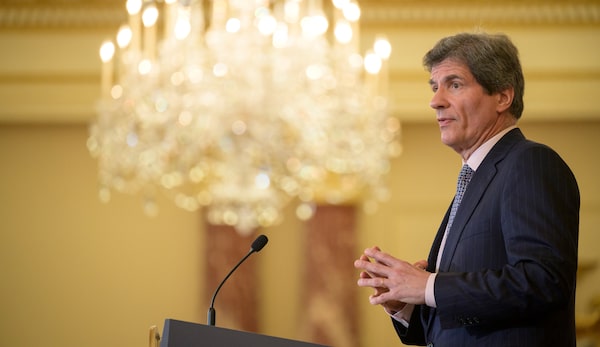
Under Secretary for Economic Growth, Energy, and the Environment Jose W. Fernandez speaks during an event on May 5, 2022 in Washington.NASA/Bill Ingalls/Getty Images
The Biden administration’s point man on securing supplies of rare earth minerals says more and more countries are joining with Canada and the United States in Washington’s push to counter China’s dominance of critical mineral supply chains.
Jose W. Fernandez, the Under Secretary of State for Economic Growth, Energy and the Environment, said the U.S. has concluded a rare earth mineral strategy partnership with a diverse group of countries, including Australia, France, Finland, Sweden, Germany, Japan, Britain and South Korea.
“It is designed to deal with the supply chain vulnerabilities that many countries have. That is, the critical minerals that we need to achieve for our clean energy future and that is very concentrated in a couple of countries,” he said in an interview.
“We have been able to get buy-in from all of these countries, so we will work together to diversify our supply chains,” he added.
Mr. Fernandez said it’s critical for the U.S. and democratic allies such as Canada to build robust, responsible supply chains for critical minerals and metals – such as those used in electric vehicle batteries – that are vital to economic prosperity and achieving global climate goals.
One of the key parts of the partnership is for these countries to share information on critical and rare earth deposits and to find Western investors to develop the mining and processing facilities, he said.
The goal is also to share financing with government development banks as well as the private sector, he said.
“Our calling card here is that we will adhere to the highest of our local social and governance standards so we avoid a race to the bottom,” he said. Efforts must also be made to reuse batteries and other components to contribute to the fight against climate change.
Critical minerals are vital to making components for fighter jets and laser-guided weapons, as well as electric vehicles, wind turbines, fibre-optic cables, smartphones and other consumer electronics.
China controls almost 90 per cent of global rare earth refining and more than 50 per cent of rare earth mining.
Alarmed by the China’s dominance, Washington and many European countries have been looking to Canada to supply critical minerals such as indium, aluminum, tellurium, niobium, tungsten and magnesium. Canada also has large reserves of lithium, which is used in EV batteries.
In a mandate letter from Prime Minister Justin Trudeau, Innovation Minister François-Philippe Champagne was directed to modernize the Investment Canada Act to protect the rare earth mining sector and enact stronger measures to “mitigate economic security threats from foreign investment.”
In recent years, Chinese companies have purchased stakes in Canadian mining interests that extract lithium, cesium, uranium and chromite – the main source of chromium, a key ingredient in stainless steel.
The federal government has begun to scrutinize deals by Chinese miners and other state-run companies. In 2020, Ottawa rejected a proposal by a Chinese state-owned entity to take over a gold mine in Nunavut.
However, it recently allowed a Chinese takeover of a Canadian-owned lithium mine in Argentina.
For subscribers: Get exclusive political news and analysis by signing up for the Politics Briefing.
 Robert Fife
Robert Fife Niall McGee
Niall McGee